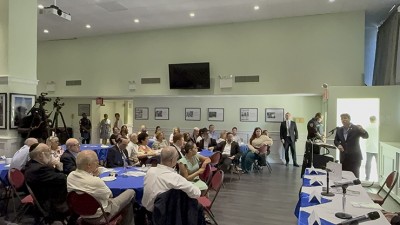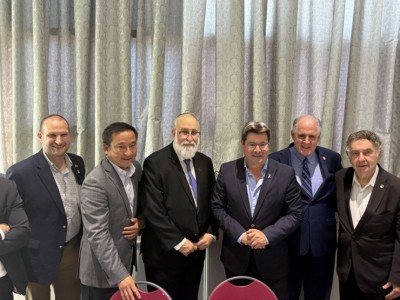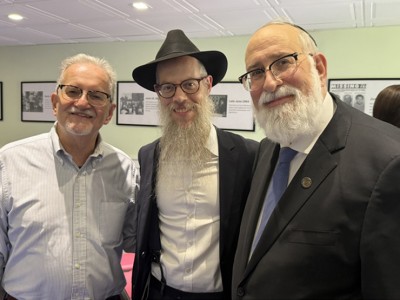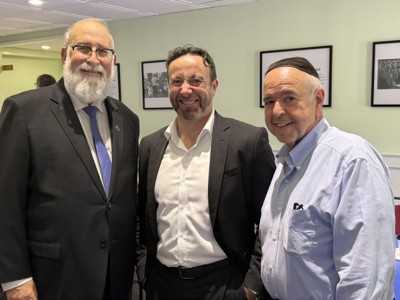



On Wednesday, July 16, the Agora at Queens College became more than a physical space. It became a statement.
The word agora, rooted in ancient Greece, referred to a public forum — a gathering place where citizens would debate values, assert truth, and chart a moral course for their society. It’s a fitting name for the location that hosted a quiet yet courageous gathering of leaders from across Jewish Queens. Here, truth wasn’t shouted — it was calmly spoken, affirmed, and shared with dignity.
The event — a private coffee meeting and open conversation with Israeli Consul General Ofir Akunis — was convened by Queens College President Frank H. Wu, whose deep commitment to Jewish life on campus has remained unwavering. Though originally scheduled for Monday, May 5, the event was rescheduled for mid-July and thoughtfully relocated to the heart of Kew Gardens Hills, home to one of the most vibrant Jewish communities in New York. The decision to bring the Consul General directly into our neighborhood — not to Midtown or some detached auditorium — sent a powerful message: Jewish voices in Queens are not peripheral; they are central.
President Wu opened with heartfelt words. He reaffirmed that Queens College continues to be a bastion of diversity, dialogue, and respect — especially in times of tension. “Jewish students don’t have to shrink here,” he said. “They are embraced here.” He proudly referenced the school’s “A” rating from the Anti-Defamation League for its efforts to confront antisemitism and spoke of deep partnerships with Hillel, the Jewish Learning Initiative on Campus (JLIC), Emet Outreach, Chabad on Campus, and the Center for Jewish Studies.
Rabbi Joseph Potasnik, Executive Vice President of the New York Board of Rabbis, offered spirited words with his trademark wit and warmth. “This is a campus where sukkahs outnumber excuses,” he quipped. He recalled once seeing Israel misspelled as “ISREAL” and suggested, “Maybe that wasn’t a typo — maybe that’s the truth. Because Israel is real.”
Then came Consul General Ofir Akunis — candid, poised, and unsparing in his clarity. He began with the atrocities of October 7: “Over 1,200 Jews murdered. Children burned alive. Entire families executed. Women raped and paraded. A Holocaust survivor kidnapped. These are not rumors. These are facts.”
He continued: “In 2005, Israel uprooted its own people from Gaza — homes, cemeteries, synagogues. We handed it over, entirely. And what did we receive in return? Rockets. Massacres. Terror tunnels. Iran’s fingerprints are on every one of them — and so are Qatar’s.”
Akunis exposed the hypocrisy of campus protests that demonize Israel while ignoring the horrors of the region’s actual dictatorships. “In Tel Aviv, we hold pride parades,” he said. “In Gaza and Tehran, they throw gay people off rooftops. Yet somehow, Israel is the one condemned?”
He condemned slogans like “From the river to the sea” and “Globalize the Intifada” as clear and dangerous incitements. “They know exactly what those words mean,” he said. “These are not calls for peace. They are calls for elimination.”
Still, the Consul General closed with hope, citing the Abraham Accords as evidence of real peace being possible when hatred is not incentivized. “We want peace,” he said. “But our first responsibility is to protect our people. And that will never be negotiable.”
NYC Council Member James Gennaro, a steadfast friend to the Jewish community, took the floor with passion. “We’re in an election year,” he said, voice rising. “And I see people trying to normalize ‘Globalize the Intifada’? Are you freakin’ kidding me?”
He looked around the room and nodded in President Wu’s direction. “This man had the courage to stand with truth — not just in statements, but in actions. Others stayed silent. Some still are. And if you’re quiet now, you’re part of the problem. End of story.”
This was not a typical campus event. It was intentionally intimate, bringing together those who sustain Jewish life on campus and beyond — the leaders, advocates, and educators whose work carries the community forward long after headlines fade. Their presence was a powerful reminder that the Jewish future in Queens is built not on noise, but on faith, partnership, and enduring truth.
Among the distinguished participants were Rabbi Reuven Kigel of Emet Outreach; Rabbi Daniel Pollack, Jewish liaison to Congresswoman Grace Meng; Rabbi Shaul and Rebbetzin Tzipah Wertheimer of Chabad on Campus; and Rabbi Mayer Waxman, Executive Director of the Queens Jewish Community Council. Also present were Sarah Freedman Adler of JCRC-NY; Zev Berman of the National Council of Young Israel; Monica Gutierrez, Education Director from the office of Queens Borough President Donovan Richards; Brandi Rubin of the Anti-Defamation League (ADL); Dan Rosen and Mark Kupferberg of the Queensborough Community College Foundation; Josh Simanowitz from the office of Assemblymember Sam Berger (who was scheduled to attend); and Pesach Osina, representing the office of New York City Council Speaker Adrienne Adams.
Additional representation came from Hillel at Queens College, the Center for Jewish Studies at Queens College (led by Bernie Spier and colleagues), JLIC (Jewish Learning Initiative on Campus), and a representative from the American Jewish Committee (AJC). Chaim Wachsberger, Chair of the Queens College Board of Trustees, was in attendance, and a seat had been reserved for State Senator John Liu, who did not attend. Kudos are due to Jay Hershenson, who serves as Vice President for Communications and Marketing at Queens College, for personally extending the invitation to Yaakov Serle, Publisher of this publication, and myself — a thoughtful gesture that underscored the college’s enduring relationship with the Jewish press and the broader community it serves.
In that room, Jewish resilience wasn’t a slogan — it was lived. Queens College had, for a moment, become a true agora once again: not just a forum of voices, but a sanctuary of truth. Because when others shout, we speak. And when others distort, we remember.
By Shabsie Saphirstein
A Beacon of Truth: Consul General Ofir Akunis Visits Queens College In A Defiant Moment Of Jewish Strength
Typography
- Smaller Small Medium Big Bigger
- Default Helvetica Segoe Georgia Times
- Reading Mode


